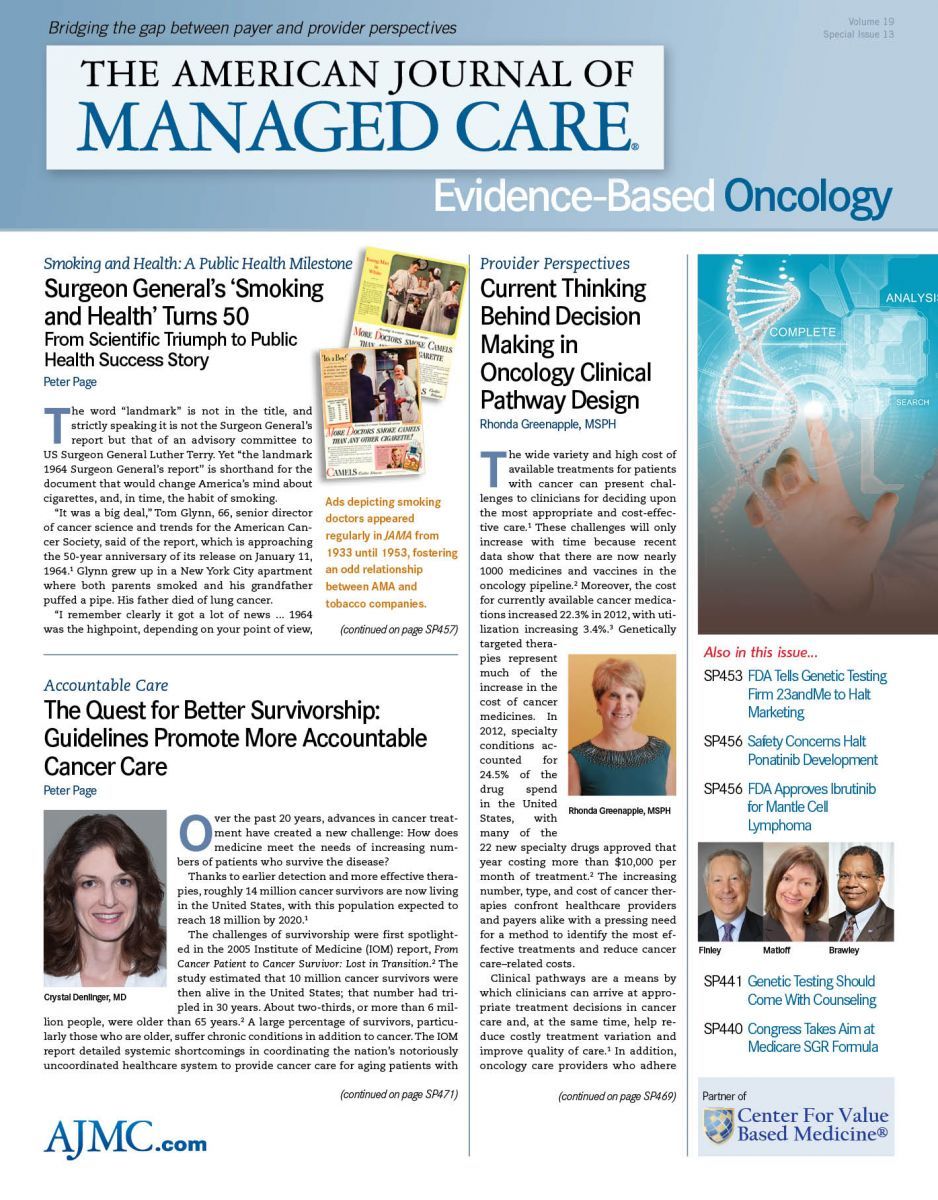- Center on Health Equity & Access
- Clinical
- Health Care Cost
- Health Care Delivery
- Insurance
- Policy
- Technology
- Value-Based Care
FDA Tells Direct-to-Consumer Genetic Testing Company to Halt Marketing
Federal regulators have ordered the direct-to-consumer genetic testing company 23andMe to stop marketing its saliva-based test without necessary approvals as a medical device, citing the potential for harm to patients who change medication doses or have unnecessary surgeries based on test results.
In a November 22, 2013, letter to 23andMe CEO Anne Wojcicki, the US Food and Drug Administration (FDA) stated that some uses being advertised “are particularly concerning,” including testing for BRCA1 and BRCA2 mutations, which are indicators for breast cancer, as well as sensitivity to certain medications, such as warfarin, a blood thinner that can be prescribed to prevent strokes or heart attacks.1
The letter warned of the dangers to patients who act on the basis of false negatives or false positives without the assistance of genetic counseling. “For instance, if the BRCA-related risk assessment for breast or ovarian cancer reports a false positive, it could lead a patient to undergo prophylactic surgery, chemoprevention, intensive screening, or other morbidity-inducing actions, while a false negative could result in a failure to recognize an actual risk that may exist,” the letter states.1
“Assessments for drug responses carry the risks that patients relying on such tests may begin to self-manage their treatments through dose changes or even abandon certain therapies depending on the outcome of the assessment,” continues the letter, which is signed by James L. Woods, deputy director for patient safety and product quality, Office of In vitro Diagnostics and Radiological Health.1
The FDA’s action comes amid growing concerns by genetic counselors and some health plan experts that direct-to-consumer testing drives poor decisions by patients, especially if they consult doctors who have limited knowledge of genetics. Ellen T. Matloff, MS, director of Yale Cancer Genetic Counseling, Yale Cancer Center, has repeatedly raised concerns about women who use tests that skirt FDA requirements through an “entertainment” loophole in Federal Trade Commission (FTC) regulations.(See Panel Discussion,SP441.)
“There’s room for error in unregulated testing,” Matloff said during a panel discussion convened by The American Journal of Managed Care earlier this fall. She cited a Government Accountability Office (GAO) study, which found that it was possible to send the same sample to 4 different direct-to-consumer companies and get 4 different results.2
Otis Brawley, MD, chief medical officer for the American Cancer Society, shared with the panel that he has treated women who had prophylactic breast removal that later turned out to have been unnecessary. At Patient-Centered Oncology Care 2013, sponsored by AJMC in Baltimore, Maryland, on November 14-15, 2013, Jan Berger, MD, MJ, described a situation in which an employer allowed the use of flexible-spending accounts (FSAs) to pay for direct-to-consumer genetic testing. “It was a disaster,” Berger said.
Both the FDA letter1 and published reports3 describe an agency frustrated with 23andMe after years of negotiations aimed at getting the company to comply voluntarily with the approval process. The Wall Street Journal reported that the FDA issued its warning letter after learning that 23andMe had started a new marketing campaign, including television commercials, after letting 6 months lapse since its last contact with the agency.3
Wojcicki has not commented; the company published the following statement on its website: “We have received the warning letter from the Food and Drug Administration. We recognize that we have not met the FDA’s expectations regarding timeline and communication regarding our submission. Our relationship with the FDA is extremely important to us and we are committed to fully engaging with them to address their concerns.”4
Despite the consensus among genetic counselors that consumers need protection and guidance, the belief that people have a “right” to their own genetic information, and the ease with which the tests have been ordered, led to some backlash over the FDA decision. In The New Yorker, writer David Dobbs described the “cultural clash” between the FDA and Silicon Valley investors, including Google, that backed 23andMe.5
“To 23andMe and to most of its customers, this is information that a person has every right to know,” Dobbs writes. “To the FDA, it is medical advice, which makes 23andMe’s delivery system medical device.”References
1. US Food and Drug Administration. Inspections, compliance, enforcement and criminal investigations.November 22, 2013. http://www.fda.gov/iceci/enforcementactions/warningletters/2013/ucm376296.htm#.Upt_klMzTtk. email. Accessed December 1, 2013.
2. US Government Accountability Office. Direct-to-consumer genetic tests: misleading test results are further complicated by deceptive marketing and other questionable practices. GAO 10-847T. July 22, 2010. http://www.gao.gov/products/GAO-10-847T. Accessed November 30, 2013.
3. Loftus P. Genetic test service 23andMe ordered to halt marketing by FDA. WSJ.com. November 25, 2013. http://online.wsj.com/news/article_email/SB10001424052702304281004579219893863966448-lMyQjAxMTAzMDAw-MTEwNDEyWj. Accessed December 1, 2013.
4. 23andMe website. 23andMe statement regarding FDA warning letter [press release]. November 25, 2013. http://mediacenter.23andme.com/press-releases/fda-letter-2013/. Accessed November 30, 2013.
5. Dobbs D. The FDA and personal genetic testing. The New Yorker. November 27, 2013. http://www.newyorker.com/online/blogs/elements/2013/11/the-fda-vs-personal-genetictesting.html. Accessed December 1, 2013.

Quality of Life: The Pending Outcome in Idiopathic Pulmonary Fibrosis
February 6th 2026Because evidence gaps in idiopathic pulmonary fibrosis research hinder demonstration of antifibrotic therapies’ impact on patient quality of life (QOL), integrating validated health-related QOL measures into trials is urgently needed.
Read More
Building Trust: Public Priorities for Health Care AI Labeling
January 27th 2026A Michigan-based deliberative study found strong public support for patient-informed artificial intelligence (AI) labeling in health care, emphasizing transparency, privacy, equity, and safety to build trust.
Read More
Ambient AI Tool Adoption in US Hospitals and Associated Factors
January 27th 2026Nearly two-thirds of hospitals using Epic have adopted ambient artificial intelligence (AI), with higher uptake among larger, not-for-profit hospitals and those with higher workload and stronger financial performance.
Read More
Motivating and Enabling Factors Supporting Targeted Improvements to Hospital-SNF Transitions
January 26th 2026Skilled nursing facilities (SNFs) with a high volume of referred patients with Alzheimer disease and related dementias may work harder to manage care transitions with less availability of resources that enable high-quality handoffs.
Read More

